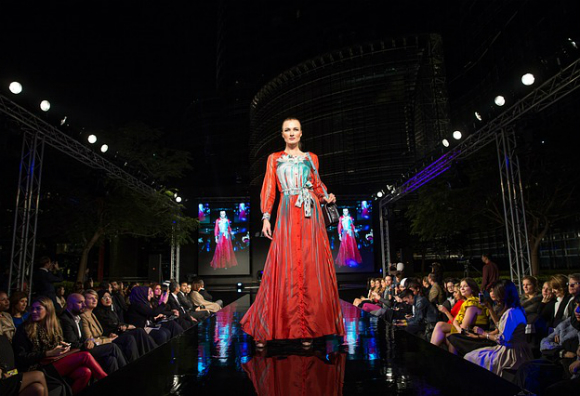The top five fashion jobs you’ve never heard of
- Emma Finamore
- 04 Nov 2018
Have you ever heard of a '3D fashion engineer'? No, we hadn't either...

Models and designers might be the first roles that spring to mind when you consider stepping into a career in fashion.
But there are plenty of trailblazing new roles that’ll be changing the face of fashion over the next decade - and new ways of getting into the industry.
From scientists and ethical experts, to psychologists and 3D designers, fashion expert and lecturer at the Fashion Retail Academy, Anthony McGrath draws back the curtain on the lesser-known but crucial roles that make all the glitz and glamour possible.
Material scientists
The drive to be eco friendly, to analyse and adapt existing sustainable products is becoming more and more important to fashion houses. Companies such as S. Café® are leading the way in this field, developing a way to turn used coffee grinds into fabric. As well as the clear environmental benefits of converting what is essentially organic waste into fabric, its product also absorbs odours and dries 200% faster than cotton. Other recent fashion breakthroughs include self-healing clothes.
Anthony McGrath said: "Sustainability is high up the agenda, and technology is going to be the main catalyst that allows the industry to bring to market products that are as easy on the environment as they are on the eye. Material scientists have a crucial role to play in revolutionising fashion in the future."
How do I get this job?
- Degree - engineering, science or design
- Apprenticeship
3D Fashion engineer
In the next five to 10 years this technology will be huge, predicts McGrath. Engineers use 3D technology to bring paper designs to life by copying them into a Computer Aided Design (CAD) file so they can be printed using a 3D printer. Nike and Reebok are presently pioneering the technology.
"It is the ability to bring designs to life like never before," McGrath added.
"And not just that. We have seen sportswear designers using it to personalise clothes and shoes. This way of creating something unique for buyers is going to be massive in the next five years."
How do I get this job?
- Degree
- Independent learning - design software
- Apprenticeship
Fashion research psychologists
The job entails predicting what the major fashion trends will be in up to five seasons' time. By analysing data and trends on the high street using psychology, they lead the way to inspire the designers.
McGrath said: "Analysts from the Future Laboratory provides information about what people wear and why they wear it to gather and develop new ideas about what upcoming trends - they then go on to showcase these trends at industry shows. Designers then use trends and ideas from these shows to inspire their next collections."
How do I get this job?
- Degree - BA as base level, can be expanded on in MA or PHD
"Analysts from the Future Laboratory provides information about what people wear and why they wear it to gather and develop new ideas about what upcoming trends - they then go on to showcase these trends at industry shows. Designers then use trends and ideas from these shows to inspire their next collections."
Government relations officers
With the fashion industry contributing £28 billion to the UK economy every year, the British Fashion Council (BFC) plays a crucial role. It organises London Fashion Week from the planning, promoting and scheduling of the event. The resulting extravaganza has wider implications for the British economy.
McGrath said: "British fashion brings more into the UK GDP than the armaments industry. It is huge. One of the biggest employers is the fashion industry, from the cotton mills in the north to the retail stores on our high streets. The role played by the BFC is crucial."
How do I get this job?
- Degree - communications preferably
- Civil service scheme
Head of sustainability
Ethics and safeguarding play an important part in the fashion industry to ensure fair pay, safe working conditions and workers’ rights. The role entails ensuring that products and materials used in clothes have been sourced properly and match the firms' ethos, for example if they are eco-friendly. The role is imperative to protect a company's reputation.
How do I get this job?
- Degree - preferably technical or scientific
- Typically working up through a business
News
- School Leaver Blog: How to deal with rejection
- Over a quarter of UK households will give more time & money to charity this Christmas
- PwC will stop using A-level Results to assess Grad Scheme Applicants
- Girls limit their career options by pursuing "worthwhile" jobs while young men chase big salaries
- University a ‘Disaster’
- Girls in Tech: Young Coding Winners Announced
- Government Support Firms with £25 Million for Training
- Revealed: the most popular undergraduate courses of 2018/19
- National Apprenticeship Week: graduate recruitment slows while more apprentices are hired
- A quarter of UK employers have never considered employing apprentices